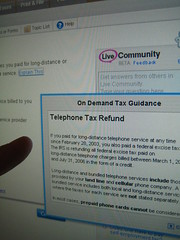 In the first part of this series we looked at some of the changes your business can go through without being required to file for a new Employer Identification Number (EIN). Now we will look at some changes that your business can go through that WILL require you to file for a new EIN.
In the first part of this series we looked at some of the changes your business can go through without being required to file for a new Employer Identification Number (EIN). Now we will look at some changes that your business can go through that WILL require you to file for a new EIN.If you are a Sole Proprietor, you will need to file for a new EIN if any of the following relate to your business restructuring changes:
- You are subject to a bankruptcy proceeding.
- You incorporate.
- You take in partners and operate as a partnership.
- You purchase or inherit an existing business that you operate as a sole proprietorship.
Make sure you are following the guidelines set forth by the IRS with regard to making sure your business changes don't interrupt your business. If you stay on top of this from the start it can save you a lot of tie and money trying to correct the problem later. Next week we will look at Corporations and what restructuring aspects can affect your business.




